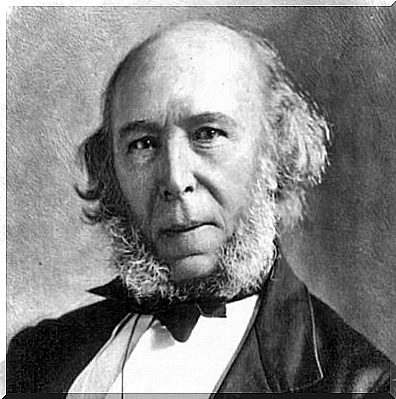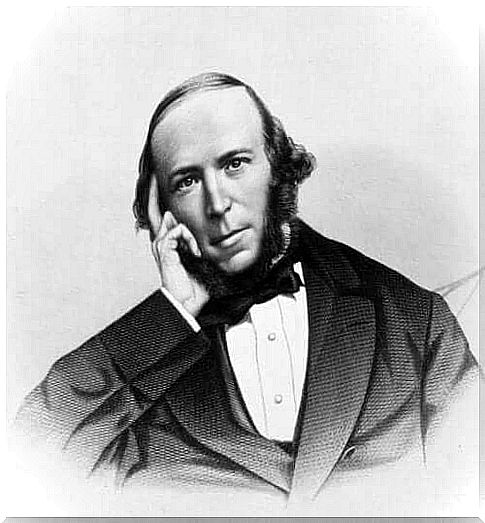Herbert Spencer: Biography And Work

Herbert Spencer was one of the greatest thinkers of his time. This English philosopher, psychologist, sociologist and expert in natural law was the greatest leader of social Darwinism and positivism in his time.
In fact, he applied evolutionist laws to philosophy and society. But his Darwinian ideas justified the dominance of some people over others, as well as the superiority of a human “race” over other races.
These ideas were welcomed in the Western world in the 19th century and the first half of the 20th century; the success his work enjoyed is proof of that. Spencer even managed to capture the attention of thinkers in many different areas.
Some writers were open to debating his ideas. Big names like Émile Durkheim, George Edward Moore and Thomas Hill Green were often associated with Spencer. Undoubtedly, he was an ubiquitous and controversial figure.

Herbert Spencer: a biography
The first years and his education
Herbert Spencer was born into a single family in 1820 in Derby, England. He died in 1903 in Brighton, England. Even though he went to school, he did not learn to read until he was seven years old. During his teens , he studied science, but never stood out as a particularly good student.
He studied engineering entirely on his own and worked on the railway between 1837 and 1846. During these years Herbert continued to learn and study on his own, and published several books on science and politics. Years later, in 1848, he became editor of The Economist.
This change marked the end of his career as an engineer, and was the start of his career as a writer and philosopher. In 1851, Spencer published his first official book – Social Statics – in which he predicted that humanity would adapt to living in a society without a real need for the state.
Career and books
Spencer used to go to meetings with other thinkers. At these events he met positivist writers who inspired him to write The Principles of Psychology in 1855. In it he defended that the human mind is subject to the laws of nature that can be explained by physiology and biology.
Years later, he published The Doctrine of Development. With this work he wanted to prove that the principles of evolution were equally applicable to philosophy, psychology and sociology. It was one of his greatest works and consisted of ten volumes that he wrote over a 20-year period.
It was not uncommon for philosophical books to become bestsellers at that time. Usually the bestsellers were novels, but Herbert Spencer stood out as a very influential thinker, selling more than a million copies during his lifetime. He was even nominated for the Nobel Prize in Literature in 1902.
Herbert Spencer and psychology
Herbert Spencer wrote his works before Darwin, and therefore he combined associationism and physiology with lamarckism. Thus, Spencer was decades ahead in adaptive psychology. He conceptualized development as the process by which the connection between ideas accurately reflects the connection between the dominant events in the environment.
The connection was established by the old principles of continuity and preparedness. Therefore , sensory development represents an adaptive adjustment to environmental circumstances. The English author also conceptualized the brain as an organized register of experiences.
He also claimed that instinct was a learned associative habit. He also defended that the mental processes of certain species were reduced to the number of associations that the brain of the animal in question could perform. In other words, according to Spencer, the differences between the mental abilities of different species were quantitative.
Spencer and social Darwinism
Herbert Spencer made several statements on a very controversial subject: he defended that social groups had different abilities to dominate nature and establish their superiority. Therefore, the rich were more capable than the poor, as the former were at the top of society while the latter were at the bottom.
For Spencer, society functioned as a biological being. Therefore, he justified the dominance of “superior races”, and advocated that we need to reduce the number of weak people in the world. Therefore, imperialism and racism were the basis of his theories.
According to him, strong, smart people had to fight for their survival, which would prevent society from breaking down. Otherwise – if the weak or least capable surpassed the strong (physically and intellectually) – the country risked perishing.

Thoughts about his life and work
Spencer defended a positivist, biological, and evolutionary view of philosophy, psychology, and sociology. He saw learning and physical as well as mental adaptability as very important. But his work was misinterpreted to fit the narrative of racists and supremacists, who cited it as scientific evidence for their claims.
That authors get their works misinterpreted and adapted is not something that is exclusive to Herbert Spencer. In fact, it has happened over and over again over the years. Something similar affected Machiavelli and even Nietzsche. Nazis and anti-Semites use their work to support their racist claims. It is not easy to talk about a group’s superiority over others without creating controversy.
Furthermore, philosophical and literary works must be treated from a certain perspective. Therefore , one must do research on at what time and under what circumstances these ideas were published, so that one can gain a better understanding of the author’s thoughts.
If we disregard controversy and reflections, there is no doubt that Herbert Spencer managed to stand out as one of the foremost multidisciplinary thinkers of his time.









